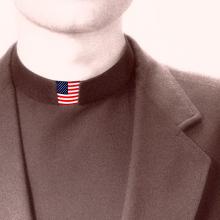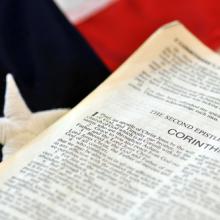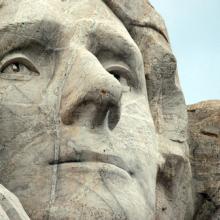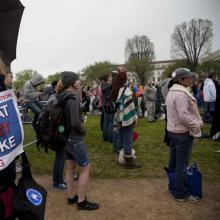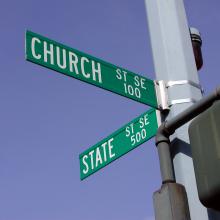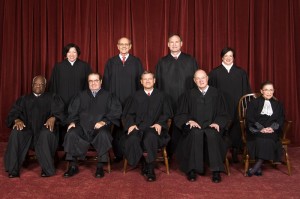Church and State
Jesus didn’t vote today
Not tomorrow
Not yesterday
Jesus didn’t need the bullet or the ballot box or
The bomb or bayonet or budget
Jesus didn’t vote today
Jesus didn’t authorize drone strikes to kill thousands
Jesus didn’t occupy other countries with standing armies
Jesus was occupied by the Holy Spirit that occupies us even still
Jesus was occupied by the truth of radical love
Jesus was not a feeble, timid, compromised, casual, comfortable, middle-class,
Or otherwise complacent ap
During the 2004 presidential election season, Sojourners put out a bumper sticker with these words: “God Is Not a Republican, or a Democrat.” The number of orders was overwhelming and we kept running out. The simple message struck a chord among many Christians who were tired of the assumptions and claims by the Religious Right that God was indeed a Republican, or at least voted a straight-party ticket for the GOP. They also absurdly implied — and sometimes explicitly stated — that faithful Christians couldn’t support Democratic candidates. We said that voting was always an imperfect choice in a fallen world, based on prudential judgments about how to best vote our values, that people of faith would always vote in different ways — and that was a good thing for a democracy and the common good.
Our efforts appeared to inject some common sense into our nation’s political discourse, but given recent electoral statements and newspaper ads from some conservative Christian leaders, it appears the message bears repeating — God is still not a Republican or Democrat.
NEW DELHI — Political leaders in the tiny Buddhist nation of Bhutan have announced a nearly six-month ban on all public religious activities ahead of the upcoming elections, citing the Himalayan nation's constitution that says “religion shall remain above politics.”
A notification by the Election Commission of Bhutan asks people's "prayers and blessings" for the second parliamentary election, expected in June 2013. But it also states that religious institutions and clergy "shall not hold, conduct, organize or host" any public activity from Jan. 1 until the election.
The ban comes a year after the country's religious affairs ministry identified Buddhist and Hindu clergy who should be barred from voting to keep a clear distinction between religion and politics.
LOS ANGELES — In a matter of days, some 1,400 American pastors are planning to break the law.
And they’re likely to get away with it.
As part of “Pulpit Freedom Sunday,” on Oct. 7, religious leaders across the country will endorse political candidates — an act that flies in the face of Internal Revenue Service rules about what tax-exempt organizations, such as churches, can and cannot do.
The IRS says tax-exempt organizations, or what they refer to as a 501(c)(3), are prohibited from participating in partisan campaigning for or against political candidates. Yet, despite what’s in the rules, the agency continues to struggle to do anything about those who defy the law.
Though the regulation has been in place since 1954, in 2009, the U.S. District Court of Minnesota ruled the IRS no longer had the appropriate staff to investigate places of worship after a reorganization changed who in the agency had the authority to launch investigations.
New procedures for conducting church audits have been pending since 2009, which has left the IRS virtually impotent in conducting any kind of new investigations. The IRS did not respond to questions seeking comment.
As I was driving today I had the radio on scan. It filtered through the stations skipping to the next station automatically. Station after station came and went. I finally stopped it on a talk show.
I listened for a time as the host was telling anyone who would listen including me that our country is moving full steam ahead in the wrong direction. He predicted the worst and called Christians to rise up and reclaim our nation.
This was not the first time I have heard such fear mongering. Not too long ago someone warned me that our government would soon “come after churches that don't toe the party line.” Another told me that our government was out to destroy the Christian faith. I think this sounds great.
Right now, it’s difficult to voice a call for civility surrounding religious debates without backlash that you’re stomping on rights or stifling someone’s voice. But here’s hoping.
Religious freedom. What does it mean, and what were we promised? In Sunday’s New York Times, Ross Douthat — columnist and author of Bad Religion: How We Became a Nation of Heretics — points out that we have a guaranteed right not only to religious belief, but to religious exercise. That right to religious exercise, he argues, is violated in cases like the HHS mandate and the Chick-fil-A debacle.
From Douthat’s piece:
“If you want to fine Catholic hospitals for following Catholic teaching, or prevent Jewish parents from circumcising their sons, or ban Chick-fil-A in Boston, then don’t tell religious people that you respect our freedoms. Say what you really think: that the exercise of our religion threatens all that’s good and decent, and that you’re going to use the levers of power to bend us to your will.”
From here, people tend to go to extremes. On one side: boycott everything whose owner you have a philosophical or religious disagreement with on a personal level. But really do it. Sure it’s easy enough to shun fast food, but enough research will likely prove that our American dream to be comfortable far outweighs our attention span. (Please excuse my cynicism, and please let me know if any of you are successful in this endeavor. I’ll tip my hat to you.)
Of course, it cuts both ways. Extremism comes in a variety of political preferences, so I’ll throw this out there as well: No, there is not a “war on religion” in the United States.
During a recent trip to Washington, D.C., I took in two exhibits on Thomas Jefferson at the Smithsonian's National Museum of American History: one on slaves at Monticello and the other on the cut-and-paste version of the Gospels known as the Jefferson Bible.
In the first exhibit, I was informed that our third president likely fathered children with his slave Sally Hemings. In the second, I was told that the Jefferson Bible was a "revolutionary document."
This is the sort of stuff that drives David Barton mad. Barton is an evangelical minister and the founder of WallBuilders, a "pro-family" organization dedicated, according to its website, to "presenting America's forgotten history and heroes, with an emphasis on the moral, religious and constitutional foundation on which America was built." Like many of his fellow travelers on the Christian right, Barton is convinced that his heroes are under attack, and he has no intention of turning the other cheek.
In his new book, The Jefferson Lies, Barton argues that academics have spread a series of falsehoods about Jefferson — that he was a racist, a secularist and an advocate of strict church/state separation. Barton thinks he knows better. His Jefferson, who died (appropriately enough) on July 4, 1826, wasn't just an "American hero." He was an orthodox Christian, too.
Lionized by Glenn Beck and other social conservatives, Barton is a culture warrior driven by desire rather than by evidence. As a result, his writing is more "truthy" than "truthful."
How much money does the U.S. government forgo by not taxing religious institutions? According to a University of Tampa professor, perhaps as much as $71 billion a year.
Ryan Cragun, an assistant professor of sociology, and two students examined U.S. tax laws to estimate the total cost of tax exemptions for religious institutions — on property, donations, business enterprises, capital gains and “parsonage allowances,” which permit clergy to deduct housing costs.
Their article appears in the current issue of Free Inquiry magazine, published by the Council for Secular Humanism, an organization of nontheists. U.S. tax law grants religious groups and other nonprofits the exemptions because of their charitable nature.
And while the authors do not claim theirs is a comprehensive or unbiased appraisal, their findings have raised eyebrows in the nontheist community, which has long sought to eliminate the tax exemptions on the grounds that they unfairly favor religious institutions.
A new White House report that offers guidance on public/private partnerships between the government and faith-based groups leaves critical questions unanswered and does not resolve the issue of religious groups' ability to discriminate in hiring and firing, church-state watchdogs said.
The 50-page report, issued Friday (April 28), comes 18 months after President Obama issued an executive order calling for more transparency as faith-based groups work with the government to meet social needs.
The sovereignty of religion in the United States is a thorny issue when it comes to state powers. But most Americans can agree that there are lines that even the Church cannot cross.
The problem is that sometimes that realization comes too late.
Sixteen-year-old Austin Sprout is the most recent victim of such religious transgressions. Oregon’s Register-Guard recently reported that Sprout’s parents declined medical care for their son, opting instead for prayer to ensure his recovery from an undisclosed but commonly preventable illness. He died in spite of their faithfulness.
Sprout’s father, Brian, reportedly died of sepsis five years ago when the family refused medical treatment for his medical injury, opting for faith-based healing. The family attends The General Assembly Church of the First Born, a congregation the Huffington Post notes is “known for their practice of faith healing.”
Billy Graham has always been a life-long learner, passionate about preaching the gospel but always ready to understand more about what that gospel means in the world. It was never surprising to me that this southern born and raised American evangelist decided early on to insist on preaching only to racially integrated coliseums and crusades, when many others just went along with their culture. Later, as a result of falling in love with the new congregations we was preaching too in Eastern Europe and the Soviet Union, had a "change of heart" on the nuclear arms race-which we featured in a cover interview with the evangelist in Sojourners magazine. Billy Graham has also been willing to admit his mistakes and grew from them, which is something all of us as "leaders" need to constantly learn from. And while a conservative evangelical all his life, Graham was never drawn to the hard edged and politicized fundamentalism of the "Religious Right" but instead often winced at them.
The U.S. Supreme Court is set to begin hearing oral arguments this week in one of the most important church-state cases in decades. In Hosanna-Tabor Church v. Equal Employment Opportunity Commission, the court will consider whether a Lutheran school in Michigan is subject to a federal law banning discrimination based on a disability.
Deep down I don't believe in the separation of church and state. Oh, I am against the idea of a state church or giving political preference to one religious sect or another, but it's the idea that somehow people can divorce their religious identity from their political identity that I just can't accept. That either our religion or our politics mean so little to us that we could restrict them to compartmentalized spheres in our lives seems absurd to me. I know people attempt to do it all the time, believing in the modern myth that an individual can assume an objective stance in this world, but reality is a lot more complex than that.
Glenn Beck can do better. Fox News can do better. When it comes to upholding truth and having civil dialogues, let's be honest, we all can do better.

